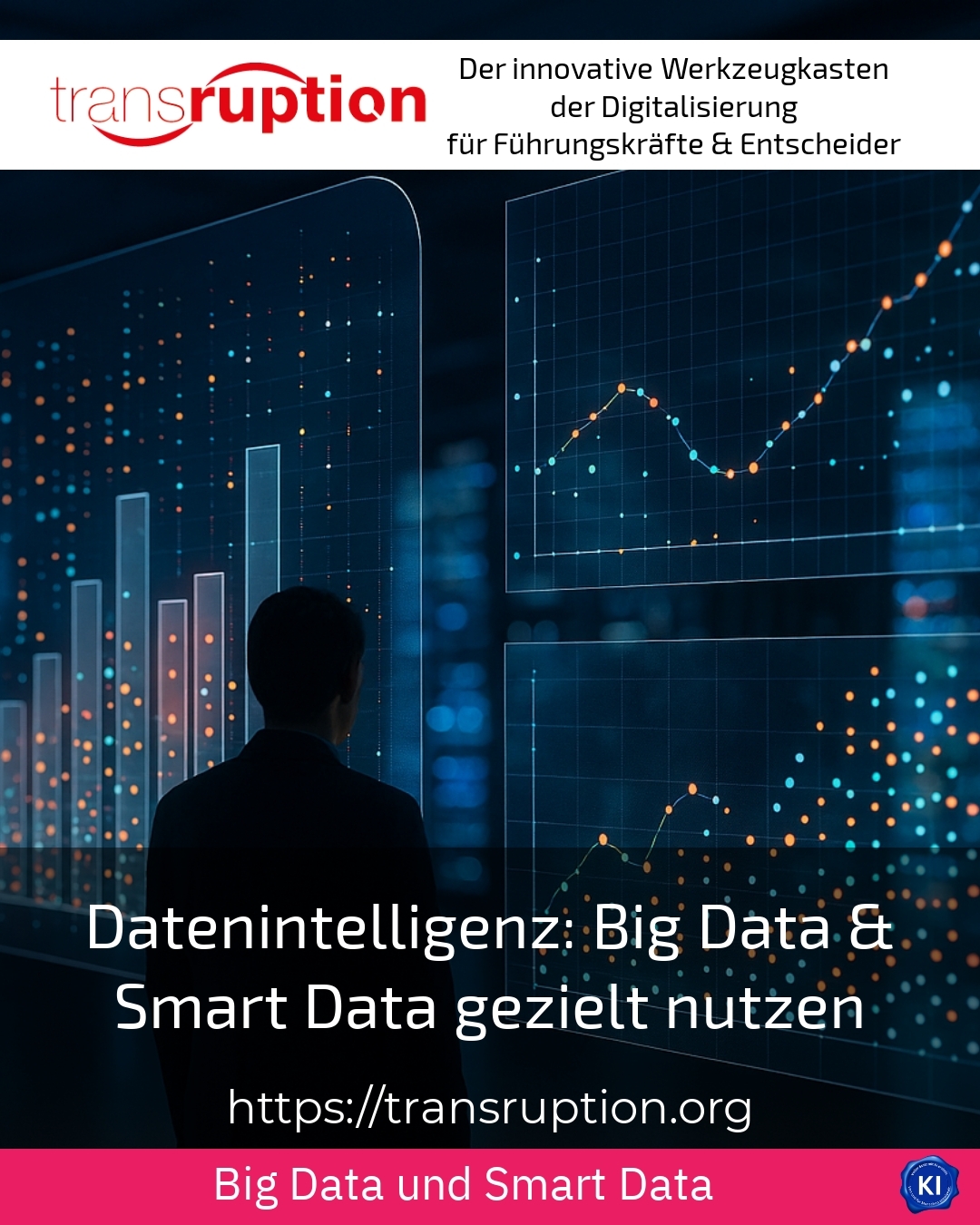In an increasingly data-driven world, the ability to extract information from large volumes of data in a targeted manner and utilise it in a meaningful way is becoming increasingly important. Data intelligence refers to precisely this expertise: it helps companies to generate valuable insights from the huge flood of raw data and thus make well-founded decisions. This is how sheer mass - also known as big data - is transformed into intelligent information, often referred to as smart data. This transformation forms the backbone of modern business strategies and innovation processes.
The difference between big data and smart data in the focus of data intelligence
Big data refers to the enormous amounts of data that are generated daily from a wide variety of sources such as machines, user interactions and sensors. This raw data alone is often complex, unstructured and not very meaningful. Industrial companies, for example, continuously produce sensor data, the analysis of which provides little added value without refinement. However, the process of data intelligence makes this data transparent and understandable.
Smart data, on the other hand, is the result of the targeted analysis, cleansing and contextualisation of big data. An example from the retail sector: intelligent analysis of customer behaviour in online shops allows personalised offers to be developed that increase both customer satisfaction and sales. The combination of data quality, security and relevance makes smart data a valuable basis for strategic decisions.
Logistics companies also use data intelligence to dynamically optimise routes and shorten delivery times with the help of smart data. In the financial sector, intelligent pattern recognition is used to identify attempted fraud at an early stage, which protects sensitive transactions. These examples show how data intelligence accompanies a wide range of industries and supports projects with customised impulses.
Practical steps for utilising data intelligence
In order for the use of big data to succeed, various steps in data processing are required, which together promote a data-intelligent corporate culture:
- Data integration: Sources such as ERP systems, IoT devices or CRM systems are networked in order to obtain a holistic picture.
- Data cleansing: Incorrect and duplicate data is removed to ensure reliability.
- Data analysis: Modern algorithms and artificial intelligence help to recognise patterns and forecasts.
- Visualisation: Clearly designed dashboards facilitate quick understanding and the derivation of measures.
- Data protection and governance: Clear guidelines ensure the responsible handling of sensitive information.
For example, a medical technology provider was able to use data intelligence to automatically analyse large image data sets and thus provide faster and more precise diagnostic support. A production company also reported a reduction in unproductive downtimes thanks to real-time monitoring and algorithm-supported maintenance planning.
BEST PRACTICE with one customer (name hidden due to NDA contract) Production was optimised through the implementation of data-intelligent systems: Real-time data acquisition enabled targeted interventions before potential errors occurred. This resulted in increased efficiency and improved product quality while simultaneously reducing costs.
Application examples from various industries to illustrate data intelligence
1) In industry, sensor data from machines enables predictive maintenance, which minimises unplanned downtimes and increases the service life of systems. This is a classic example of intelligent data utilisation.
2 In retail, personalised marketing campaigns are implemented by analysing customer interactions on the internet. Smart data can be used to reliably recognise purchasing preferences and create needs-based offers.
3. in the healthcare sector, intelligent data analyses support research into disease patterns, enable personalised therapeutic approaches and thus improve patient care.
Impact and benefits of data intelligence for companies
Companies that use data intelligence strategically benefit from improved decision-making quality, greater agility and tailored process optimisation. The use of smart data opens up insights that accelerate innovation processes and secure competitive advantages. At the same time, this approach helps to manage resources more efficiently and increase the transparency of business processes.
Another plus: the combination of big data and smart data allows risks to be recognised and managed at an early stage, such as financial irregularities or production bottlenecks. Data intelligence makes it possible to make quick adjustments and react flexibly to market changes.
My analysis
Data intelligence is more than just a modern term - it is essential for companies that want to remain successful in the digital era. With the right strategy, big data becomes a source of valuable smart data and thus supports well-founded decisions, efficient work processes and innovative business concepts. Examples from sectors such as industry, retail and healthcare illustrate that the targeted use and intelligent analysis of data can provide significant impetus and support the development of complex projects in a meaningful way. Companies that follow this path create a solid foundation for better mastering the challenges of the future.
Further links from the text above:
Data intelligence: With Big & Smart Data for better ...
Big data: definition, application and future outlook
Smart Data: Definition, application and difference to Big ...
For more information and if you have any questions, please contact Contact us or read more blog posts on the topic TRANSRUPTION here.















